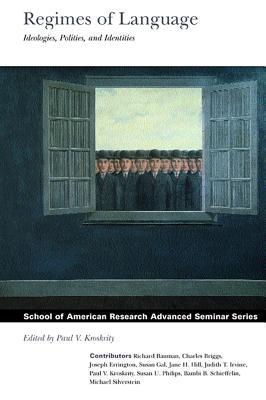In Regimes of Language, ten leading linguistic anthropologists integrate two often segregated domains: politics (without language) and language (without politics). Their essays contribute to an understanding of the role of language ideologies and discursive practices in state formation, nationalism, and the maintenance of ethnic groups, on the one hand, and in the creation of national, ethnic, and professional identities, on the other. Moving beyond a preoccupation with ideologies of cultural "others," the volume includes reflexive analyses of European language philosophy and historical linguistics, US academic ideologies of language, political discourses by US journalists and elite image advisors, and the impact of Christian missionaries on indigenous peoples in the Papua New Guinea highlands.

Regimes of Language: Ideologies, Polities, and Identities
In Regimes of Language, ten leading linguistic anthropologists integrate two often segregated domains: politics (without language) and language (without politics). Their essays contribute to an understanding of the role of language ideologies and discursive practices in state formation, nationalism, and the maintenance of ethnic groups, on the one hand, and in the creation of national, ethnic, and professional identities, on the other. Moving beyond a preoccupation with ideologies of cultural "others," the volume includes reflexive analyses of European language philosophy and historical linguistics, US academic ideologies of language, political discourses by US journalists and elite image advisors, and the impact of Christian missionaries on indigenous peoples in the Papua New Guinea highlands.